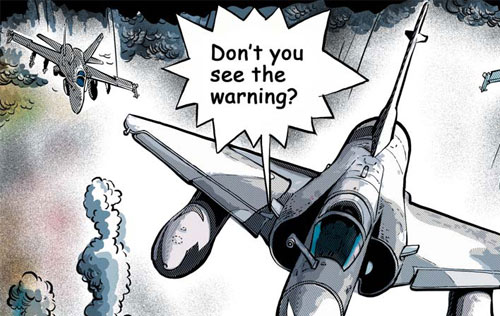Bombs aim for regime change
Updated: 2011-03-25 10:29
By Li Qingsi (China Daily European Weekly)
|
 |
West-led military intervention in Libya goes far beyond UN mandate and will generate more discontent and discord
The escalating West-led air strikes on Libyan government forces and their military facilities have added new uncertainties to the situation in Libya and caused widespread concern throughout the international community.
Western military intervention was quick to follow the immediate dominance of Muammar Gadhafi-led Libyan government forces over the rebels.
The France-spearheaded air assault on March 19 and the subsequent naval bombardments destroyed many of the defense facilities of Libyan government forces and stopped them gaining an upper hand over the rebels.
In the eyes of Western countries, the defeat of the opposition forces would have halted their long-cherished dream of overthrowing the Gadhafi regime, and the collapse of the rebel forces would no doubt have deepened Gadhafi's enmity toward the West and prompted him to seek opportunities for retaliation.
The rush by some Western countries to go to war demonstrates their attempt to uproot the West-antagonistic Gadhafi regime in North Africa. In the eyes of these Western countries, they morally justify themselves in dethroning the decades-long autocrat who is accused of carrying out a civilian slaughter.
However, the heavy casualties caused by several rounds of Western bombardment also completely contravene the intentions of the UN authorized "no-fly zone" in Libya, which was passed for the protection of civilians.
If the Western bombardment of Libya's air defense system is to ensure the implementation of the "no-fly zone" resolution passed by the UN Security Council, then their efforts to overthrow the Gadhafi regime are obviously outside the actions authorized by Resolution No 1973.
That Gadhafi has been in an isolated position since the start of the crisis can be attributed to his unpopularity as a result of his decades-long arbitrary decision-making style, his deep-rooted feud with Western countries because of his longtime intransigence toward the West, and the disparities in income distribution in Libya.
Gadhafi's unwise remarks since the outbreak of social unrest in Libya and his inflexible stance toward Western countries, even when they were making preparations for military action, undermined any diplomatic moves to seek a way out.
As a result, some Western countries have become more resolute in their plan to dethrone Gadhafi. Even the League of Arab States (LAS) has chosen to side against him, although the defection of the LAS is also a result of the West's strategy to divide the Arab world.
While it is true that Gadhafi used bombers to suppress the opposition forces and there is no doubt that such conduct should be condemned, that did not justify immediate Western military intervention, especially at a time when the UN Security Council had agreed to take measures to prevent the situation in Libya from deteriorating.
Gadhafi's ruthless attack on opposition forces is no excuse for Western countries to use military means to push forward their power politics in a sovereign nation.
Given that Iraq and Afghanistan are still occupying Washington's mind, and that the United States is still trying to extricate itself from the impact of the global financial crisis, it is France that has taken the lead in advocating military intervention.
The Libya crisis is seen as a chance for Paris to break Washington's strategic chessboard in the Middle East and gain the initiative in the struggle among the world's powers for dominance in the region.
The intervention by outside powers into the internal affairs of a sovereign nation means a big step backward in the world's pursuit of democracy and peace and demonstrates the double standards some Western countries have adopted toward the social unrest that has occurred in various Middle East countries.
But like the interventions in Iraq and Afghanistan, the Western military action in Libya is ultimately not to liberate Libya from Gadhafi's rule or to push forward democracy and human rights in the North African nation. The rich oil resources in the country are the overwhelming reason behind Western military action.
The wars in Iraq and Afghanistan have already shown that the West's claim that "human rights stand higher than sovereignty" is groundless.
The West-led military attack on Libya once again proves the historical truth that might writes the truth and that Western colonialism still exists, which will only sow the seeds for terrorism.
The author is a professor with the School of International Relations at Renmin University of China.
E-paper

Rise and shine
The Chinese solar energy industry is heating up following recent setbacks in the nuclear sector
Bombs aim for regime change
CSI, with a twist
Literary path
Specials

Peony express
Growers of china's unofficial national flower are reaching out to europe for help

Tea-ing up
More turning to Chinese tea for investment opportunities like vintage wine

A cut above
The ancient city of Luoyang is home to a treasure trove of cultural wonders.
